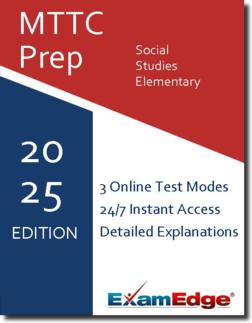MTTC Social Studies - Elementary (105) Practice Tests & Test Prep by Exam Edge - Topics
Based on 22 Reviews
- Real Exam Simulation: Timed questions and matching content build comfort for your MTTC Social Studies - Elementary test day.
- Instant, 24/7 Access: Web-based MTTC Social Studies - Elementary practice exams with no software needed.
- Clear Explanations: Step-by-step answers and explanations for your MTTC exam to strengthen understanding.
- Boosted Confidence: Reduces anxiety and improves test-taking skills to ace your MTTC Social Studies - Elementary (105).

Understanding the exact breakdown of the MTTC Social Studies - Elementary test will help you know what to expect and how to most effectively prepare. The MTTC Social Studies - Elementary has 100 multiple-choice questions The exam will be broken down into the sections below:
| MTTC Social Studies - Elementary Exam Blueprint | ||
|---|---|---|
| Domain Name | % | Number of Questions |
| World History | 14% | 14 |
| U.S. and Michigan History | 18% | 18 |
| Geography | 27% | 27 |
| Political Science | 14% | 14 |
| Economics | 13% | 13 |
| Inquiry, Interdisciplinary Perspectives, and Public Discourse | 14% | 14 |


